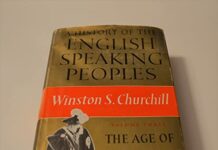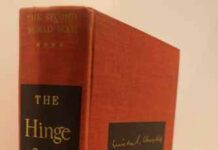
Ebook Info
- Published: 1986
- Number of pages: 720 pages
- Format: PDF
- File Size: 14.55 MB
- Authors: Winston S. Churchill
Description
Churchill’s account of the eight uneasy, dangerous months from May to December 1940, as Britain stands isolated and Germany follows its warpath.In Their Finest Hour, Winston Churchill describes the invasion of France and a growing sense of dismay in Britain. Should Britain meet France’s desperate pleas for reinforcements or conserve their resources in preparation for the inevitable German assault? In the book’s second half, entitled simply “Alone,” Churchill discusses Great Britain’s position as the last stronghold against German conquest: the battle for control of the skies over Britain, diplomatic efforts to draw the United States into the war, and the spreading global conflict.Their Finest Hour is part of the epic six-volume account of World War II told from the viewpoint of a man who led in the fight against tyranny, and enriched with extensive primary sources including memos, letters, orders, speeches, and telegrams, day-by-day accounts of reactions as the drama intensifies. Throughout these volumes, we read the strategies and counterstrategies unfold in response to Hitler’s conquest of Europe, planned invasion of England, and assault on Russia, in a mesmerizing account of the crucial decisions made as the fate of the world hangs in the balance.
User’s Reviews
Editorial Reviews: About the Author Winston S. Churchill (1874-1965) has been called by historians “the man of the twentieth century.” Prime Minister of Great Britain (1940-1945), Churchill won the Nobel prize for literature in 1953.
Reviews from Amazon users which were colected at the time this book was published on the website:
⭐Americans have a warped view of history, and little understanding of the role of aristocracy and class in history–our own or Britain’s. Churchill was a card carrying member of the aristocracy; one of the small group of men who ran England up to, and through, World War II. Their Finest Hour is an amazing documentation of the very height, and at the same time, end, of the all powerful aristocracy in England.Churchill’s second volume of his Six Volume history of the Second World War begins with May, 1940, as the German army is rolling through Luxembourg and Belgium (both clinging to their neutrality right up to the minute the German tanks crossed the border), toward a woefully unprepared France (still reliant upon the Maginot Line, which in turn depended on Luxembourg and Belgium neutrality.Churchill has just assumed the post of Prime Minister, after having spent the prior year (and several before that) as an outsider bemoaning the refusal of Britain (and France) to prepare to meet the rising German threat. Those years of exile are the subject of volume one.The present volume focuses on the extraordinary difficulties Churchill and others in the British government faced once the war actually began. Once France was forced to surrender, Germany was left in what most of us think of as continental Europe without any enemies. It had allied itself with fascist Italy, made peace with Stalin, conquered Poland and France, neutralized Spain, and occupied Austria, Luxembourg, Belgium, Norway, and the Netherlands.In this sense, Britain stood alone. There was a very real risk that Germany could invade and conquer Britain in the Summer and early Fall of 1940. The German bombing of London was increasingly effective, and the British army was in total disarray, having just been forced to abandon France, leaving most of its equipment behind. Just how worried Churchill was comes through clearly and terrifyingly in this volume. Had Germany succeeded, the world might look very different today–the Second World War would have been transformed into a truly intercontinental war, with Asia and Europe allied against North America.Of course, Britain was not really “Alone.” Greece and Turkey were firm allies; Bulgaria and Yugoslavia stood against Hitler and Italy; and Britain controlled most of what we today think of as the third world–from Gibraltar at the southern tip of Europe, to Egypt, to South Africa, India, Malaysia and Burma, and Australia. Only by adopting a firmly eurocentric view of the world (which Churchill clearly had) can he title this volume “Alone.”Churchill and the rest of his government were able to move seamlessly into power, and immediately take control of this world wide empire precisely because of the peculiarly insular class system that ruled Britain. Even as an outsider, Churchill clearly had full access to all of the centers of power. He could not bend and shape them, but he was fully in the loop. Personal relationships and lifelong associations meant that he regularly met with leaders at all levels of the power structure–including most importantly (but by no means exclusively) top politicians and naval personnel. This sort of access by “losing” politicians in the United States today is unimaginable. Can anyone seriously envision Bush allowing the head of the CIA to meet regularly with Howard Dean to review the intelligence about weapons of mass destruction in Iraq?The only weakness in this volume is Churchill’s over reliance on his own contemporaneous telegrams and memos. he was absolutely prolific, apparently having dictated dozens of multi-page memos daily–yet still finding time to run the government. While fascinating historically, they really are bureaucratic memos. The first volume, by relying more on narration and less on historical documents, allowed Churchill greater reign to his incredible skill with the English language. Here, long sections read like just what they are–official documents written in haste, for the historical record.That said, his brilliant use of words shines through. The most stirring passage is toward the end–his eulogy in November, 1940, for Neville Chamberlain, who more than anyone was responsible for “appeasing” Hitler. Rather than lapse into “I told you so”, he marshals some of the most stirring words ever written to praise Chamberlain; urging history to judge him on the strength of his character rather than the results of his actions, which are subject to the fickleness of history.In sum, this is a remarkable book, chronicling a remarkable time in history, written by a remarkable man who played a central roll in events. I can think of no other book by anyone at anytime which brings together all three of these elements–and is well written!
⭐This volume of Churchill’s great history of WWII gives the reader a “fly on the wall” look at the activities of British and French leaders at various levels leading up to the Nazi invasion of Western Europe and the horrendous aftermath. Churchill includes letters and other memoranda he sent to European leaders, his cabinet and military leaders, and letters to Roosevelt and Stalin. He writes about unsuccessful efforts to persuade Italy to remain neutral and his efforts to support Greece and African insurgents fighting Axis control. The most interesting portion of the early chapters is the description of the failures of French military leaders to respond quickly to the Nazi attacks, the lack of French citizen opposition to exposed German troops marching through their villages and towns, and the heroic efforts of the Northern French Army subordinate leaders and the generals of the British Expeditionary Force to save themselves from annihilation. Although the Allied Northern Armies were cut off from the main French forces and were being surrounded by German armored divisions, they fought their way back to the coast at Dunkirk where they held a small beachhead. Anticipating the need to evacuate troops, Churchill’s Admiralty staff had assembled a huge number of watercraft ranging from destroyers to small, personal pleasure boats to bring as many troops back to England as possible. Churchill had hoped to salvage 50,000 troops to help ward off a future invasion of England. Hitler had ordered the Luftwaffe to bomb the Allied enclave and shipping to oblivion. Although outnumbered four to one, the RAF was able to keep much of the Luftwaffe at bay, inflicting heavy losses. The Allied forces fought a heroic rearguard action against the superior Nazi armies that allowed the evacuation to be a success. Nearly all the B.E.F. (+/- 200,000 men) plus another 130,000 French and Belgian troops were brought back to England. The tenacity of these troops, the RAF, and the British people’s determination to fight undoubtedly played a large part in Hitler’s decision to abandon his plans to invade England.
⭐This and all Churchill’s books are essential for anyone studying this conflict. Not the last word as it records the views and experiences of one person from his own aspect, so may leave out things which the author would rather not draw too much attention to, and may be incomplete in other directions. It needs to be read along with other accounts. The primary sources included are of the greatest value. The book answers many questions – did Hitler really intend to invade Britain, and if he did, when did he give up the intention to do so? What conditions had to be met for Operation Sealion to be feasible? These important issues are addressed.
⭐There’s really not much one can say about this book as the books speak for themselves, written by the man who made most decisions during World War II this book is filled with interesting facts and figures and is a must read for anybody who has an interest in that period or in English history. Well written and very informative. Makes for a great read.
⭐Great read. Great detail about churchills second world war.
⭐Amazing insights from a remarkable man.
⭐This was a present for my husband who is really enjoying reading it. Churchill writes clearly and authoritatively about the war years.
Keywords
Free Download Their Finest Hour (The Second World War) in PDF format
Their Finest Hour (The Second World War) PDF Free Download
Download Their Finest Hour (The Second World War) 1986 PDF Free
Their Finest Hour (The Second World War) 1986 PDF Free Download
Download Their Finest Hour (The Second World War) PDF
Free Download Ebook Their Finest Hour (The Second World War)





